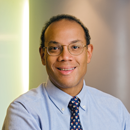And why MPC’s September 15, 2020 Annual Event honors John Rogers

Screenshot courtesy Bloomberg News
In August 2019, John Rogers appeared on Bloomberg's "The David Rubenstein Show"
This profile is part of a series that highlights the work of government, business and community leaders in creating a more equitable and inclusive Chicago region.
Is Chicago capable of change? Amidst the devastation of COVID-19, it’s a fair question. The data on the pandemic’s disproportionate impact on Black and Brown communities recalls the stark findings from Urban Institute’s and the Metropolitan Planning Council’s 2017 quantification of the enormous Cost of Segregation.
Our region must commit to a larger vision, to #BuildBackBetter, which means dismantling the institutional barriers that create disparities and inequities by race and income.
But there are models and reasons for hope, notably the dramatic progress made by the University of Chicago in diversifying its use of professional service providers. This is exactly the kind of institutional transformation MPC issued a call for in Our Equitable Future Roadmap. Persistent patterns of racial inequities tell us we simply cannot afford to “return to normal.” Our region must commit to a larger vision, to #BuildBackBetter, which means dismantling the institutional barriers that create disparities and inequities by race and income.
John Rogers, Chairman and Co-CEO of Ariel Investments and Vice Chair of the Board of Trustees of the University of Chicago, exemplifies the leadership that is needed to deliver on this bold vision for equity. He is the natural choice to receive MPC’s 2020 Champion Fighter Award at our September 15th annual event thanks to Presenting Sponsor PNC.
John’s influence reaches nationwide, and his track record of leadership in Chicago is lifelong. As a board officer for the University of Chicago, John has been a strong advocate for minority owned and managed businesses. Through the University of Chicago’s Office of Business Diversity and its annual Professional Services Symposium, there has been a significant increase in contracts with minority and women-owned professional service firms between 2009 and 2020:
- Over the last 11 years, leaders from the University have engaged with more than 350 women and minority-owned businesses in the professional services industry, resulting in contracts with more than 90 companies.
- In 2010, UChicago hired their first two African-American money management firms. Today, the University endowment has a total of 25 minority and women-owned money management firms investing funds.
- Over the past five years, UChicago’s General Counsel has initiated retainers with 23 minority and women-owned firms, including minority and women partners from majority firms.
- In 2018, the University and the Medical Center entered into a contract with AgileOne, the largest minority women-owned staffing agency in the country, representing over $3.7 million.

University of Chicago
Aerial image of the University of Chicago
As the city’s largest private employer on the South Side, the University of Chicago has made diversity, equity and inclusion contracting its standard practice. Since launching the Professional Services Symposium in 2009 to increase contracts with women-owned or minority-owned business enterprises for professional services (such as legal, financial management, and communications services), the University has spent over $106 million with more than 90 MWBE professional service firms. This is a key indicator of progress towards institutionalizing racial equity. Professional service firms are a fast-growing, high-wage sector of the economy, yet minority firms remain substantially underutilized by major corporations, foundations, and educational institutions.
Since 2009, the University of Chicago has spent over $106 million with more than 90 minority and women-owned professional service firms.
Nadia Quarles, Assistant Vice President in the Office of Business Diversity, plays a large role in driving this progress. “To have the support of our Trustee John Rogers, who advocates for minority professional services firms at the highest levels of the University is truly invaluable. There is no one who can match John’s tenacity and commitment to racial inclusion.”
As the founder of the nation’s largest minority-run mutual fund firm, John Rogers is persistent and consistent. In 2018, the University created the John W. Rogers, Jr. Business Diversity Impact Award to be presented annually to a University leader in recognition of their outstanding commitment to hiring minority and women-owned professional service firms and advancing business diversity in their department and institution-wide.
When asked about his personal motivation for this work, John Rogers notes the influence of his family and the luminaries of Chicago’s Black business community, like Edward Gardner and John H. Johnson, who preceded him. He executes on the responsibility of holding institutions accountable through his board service to major corporations like McDonald’s and Nike. “What I tell folks is, part of my job as a board member is to help you live up to the commitments that you've made publicly,” he declared.
John Rogers has always been a proponent of driving institutional change from the top. In 2002, he co-founded the Black Corporate Directors Conference to push for diversity in corporate leadership. In 2019, he supported a bill in the Illinois legislature that would have required publicly-traded corporate boards in Illinois to have at least one woman, one African American, and one Latinx member by the end of 2020. It was gutted, instead only requiring an annual report on corporate board diversity.
Maintaining a serious perspective on the work still ahead, John Rogers stresses that “It's just kind of unfortunate that our anchor institutions, for the most part, look like baseball did in 1940 when it comes to including people of color. It's just the reality of it.”
“It's just kind of unfortunate that our anchor institutions, for the most part, look like baseball did in 1940 when it comes to including people of color. It's just the reality of it.” —John Rogers
The Metropolitan Planning Council honors John Rogers for his pivotal role in raising the bar for excellence, and inspiring other leaders and organizations to follow suit. Notably, the University of Illinois at Chicago, the Art Institute of Chicago, Northwestern University, the Obama Foundation, and Johns Hopkins University all chose to replicate UChicago’s Symposium model. As we seek to equitably #BuildBackBetter, MPC looks to business and civic leaders like John Rogers to lead the way.

Image courtesy Ariel Investments
For more information on sponsorship, please contact Amber Webb, Vice President of Philanthropy, at awebb@metroplanning.org or 312.863.6010.